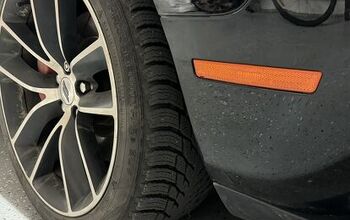The Mileage Tax Cometh: The State Giveth, The State Taketh Away

“Hybrid and electric cars are sparing the environment. Critics say they’re hurting the roads,” writes Bloomberg. “The popularity of these fuel-efficient vehicles is being blamed for a drop in gasoline taxes that pay for local highway and bridge maintenance, with three states enacting rules to make up the losses with added fees on the cars and at least five others weighing similar legislation.”
According to Arizona state Senator Steve Farley, a Democrat who wrote a bill to tax electric cars, “the intent is that people who use the roads pay for them. Just because we have somebody who is getting out of doing it because they have an alternative form of fuel, that doesn’t mean they shouldn’t pay for the roads.
State and local gas-tax revenue has declined every year since 2004, falling 7 percent to $37.9 billion in 2010, this according to inflation-adjusted data from the allegedly nonpartisan research group. Institute on Taxation and Economic Policy.
That, however, is not the fault of hybrids and EVs. The market share of hybrids is pretty much stuck at around 3 percent, Hybridcars says. The market share of electric vehicles, which generate no gas tax at all, is close to unobservable, pure EVs and plug-ins together hold half a percent of the American pie.
What is true is that sales-weighted MPG of all new automobiles bought and sold in the U.S. os steadily going up. In October 2007, the index stood at 24.7 MPG. In May, all cars sold had an average CAFE rating of 30 MPG.
This is declared national policy, and automakers are working hard to meet the policy. State tax revenue becomes collateral damage.
Farley’s proposed anti-EV tax is a mileage tax. His bill wants one cent per mile driven on Arizona highways by “a vehicle that is propelled by a motor that is powered by electrical energy from rechargeable batteries or another source on the vehicle or from an external source in, on or above the street and that is not capable of being powered by motor vehicle fuel or use fuel.”
/p>
In New Jersey, Democratic State Senator Jim Whelan proposed a similar bill to tax cars by mile driven. The cars would be tracked by GPS. Facing criticism, he now proposes that “owners of alternative-fuel vehicles would be charged an annual fee – about $50 per year, though that is not final” as The Atlantic City Press says.

Bertel Schmitt comes back to journalism after taking a 35 year break in advertising and marketing. He ran and owned advertising agencies in Duesseldorf, Germany, and New York City. Volkswagen A.G. was Bertel's most important corporate account. Schmitt's advertising and marketing career touched many corners of the industry with a special focus on automotive products and services. Since 2004, he lives in Japan and China with his wife <a href="http://www.tomokoandbertel.com"> Tomoko </a>. Bertel Schmitt is a founding board member of the <a href="http://www.offshoresuperseries.com"> Offshore Super Series </a>, an American offshore powerboat racing organization. He is co-owner of the racing team Typhoon.
More by Bertel Schmitt
Latest Car Reviews
Read moreLatest Product Reviews
Read moreRecent Comments
- Bd2 Hyundai is, of course, not on this list as a forefront leader in ethics and accountability. Meanwhile the egg is in Toyota's face yet again.
- Jkross22 This is likely my final chime in/experience with our leased CX9 as the lease is up in less than a month. We're getting 19.5- 20.0 mpg combined over the last few months. That's with the legacy 2.5T with the 6 speed auto. Not great but it is a responsive drive train and there's a fuel penalty for that I suppose. If you're thinking about picking up a used CX9, Mazda settled a lawsuit that extends the warranty of the 2.5T for another 2 years/24k miles. Double check to make sure the 2.5T model you're looking at is covered by this. This had to do with an oil consumption issue. We did test drive the CX90 with the inline 6. It was nice, but not what I was expecting in terms of sound and smoothness. As others have said, it ain't no BMW inline 6. Power was ok, but oddly not as responsive as the 2.5T. Maybe they'll get that sorted in the next couple of years. The improved mpg has to be due to the hybrid system and shutting off at stops. Lastly, Mazda's lease return process is terrible. They're good at reminding us the end is nigh, but they outsourced the inspection process to AutoVin. AutoVin noted a scratch that AutoVin said is normal wear and tear, but Mazda says (in their lease end paperwork) exceeds normal wear and tear. I took it to the nearest dealer and the manager there claimed to have no say in the return process and was unable/unwilling to assist.I called the leasing dealer and they said they couldn't help either. I called Mazda Finance and they said they would send AutoVin out again for a 2nd look, and no one has followed up to do this. In fact, it's extraordinarily difficult to get anyone at Mazda Finance to answer a call. Abysmal customer support all around. I would not lease a vehicle from Mazda again.Mazda says that they can send a final bill to us within 60 days if they determine there is anything beyond normal wear and tear. I guess I'll repair the scratch, but customers shouldn't be left guessing or getting conflicting information from the inspection company and the manufacturer. And neutering your dealers in this process is counterproductive and foolish.
- MaintenanceCosts Everyone at every stage of the supply chain lies. On the one hand OEMs should be vigilant, but on the other hand this sort of thing is going to happen once in a while no matter how careful an OEM is. It's hard to know from this report whether the OEMs cited here reasonably should have known of the issue or not.The real solution is for more countries to have and enforce laws against bad labor practices. We can help with that a bit through trade agreements but in the end the countries have to make the decision themselves to do it. Xi is not going to make that decision.
- ToolGuy QOTD: Which chain has the best coffee on the interstate?(Tops for me right now is the robot dispenser at Pilot - grinds your choice of better-than-average beans and brews one cup at a time. Did back-to-back comparisons last week with the QuikTrip robot and it is not as good.)
- Paul Alexander If there had been no Congressional ban on this type of practice, obviously it would be okay. I allow politicians to dictate my morality.

































Comments
Join the conversation
"State and local gas-tax revenue has declined every year since 2004, falling 7 percent to $37.9 billion in 2010" You know what would be a hoot? Someone pulling the data to show how that $37.9 billion collected in 2010 was spent. $20 and a tofu steak says more than half of that $37.9mm got taken up by 'general fund allocations' or some iteration thereof.
Wow, this taxation thing is getting complicated. And it would only get worse if we try to figure out how to tax vehicles powered by CNG, H2, ethanol, gasoline diesel, electricity, or some combination of these. Or how exactly would we obtain vehicle miles driven in states that have inspection requirements? GPS monitoring seems intrusive. What about removing ALL taxes from fuels of any type, and consider just an "Infrastructure" tax as part of income taxes (both Federal and State), on the assumption that (like school taxes), everyone benefits any way. Trucking companies would pay a higher corporate tax rate, since trucks "damage" infrastructure more than cars (reportedly). Wouldn't that simplify things while still being able to have enough funds for our roads and bridges? Sometimes I think we (USA) bend over backwards to try to be fair down to the last dime in our tax code, to accommodate individual situations, and fail to look at the big picture.... ----------------